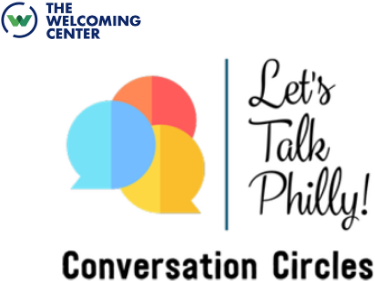We help participants build language skills through peer-to-peer learning.
Develop their English-speaking skills
Share information about resources and opportunities in the city
Learn about wellness and wellbeing in support of their economic and social integration
Help participants build new friendships and connections that help reduce social isolation; we have a lot of fun, a form of medicine to help reduce stress and anxiety.
Participants are inspired to support other immigrants which helps build their personal agency.
Through our conversation circles, people discuss new ways to build their lives and accomplish their goals, which helps normalize their integration experience.
We support participants to share their skills and talents that promote creativity.
Participants can share their stories and experiences without fear.
Our conversation circles are not just having conversations. We create a safe environment for all, where they develop confidence that helps them gain a sense of belonging.
We create a safe space where participants can share their stories and experience without fear.
Good leadership skills are strengthened. Through increased personal efficacy, participants are better equipped to work on their goals.
How do we understand peer-to-peer learning
Peer-to-peer learning is not just peers learning specific things from each other. To better understand peer-to-peer learning, you have to consider what happens in the social interaction or exchange between peers.
One of the most important factors in social interaction is emotion. If done well, listening must be involved. Listening touches a nerve, so to say. Through silence and space, smiles or gestures, and the human voice, a peer in the interaction can easily feel listened to. That’s when learning starts happening.
Listening, and the emotions that come with it due to empathy, is also conducive to relationship building, and trust building elicits a sense of possibility. When you consider that peer-to-peer learning has implicit a degree of personal agency -that is, taking responsibility for your own learning and development- the relationship that develops between peers comes to reinforce the sense of agency, both at the personal level but also collectively.
How do we define good leadership
Good leadership can be defined as the ability to listen to others and respond with actions that involve those who inspired and who are impacted by those actions. The human qualities and skills sets of a leader can vary widely, but it is the ethical values and practices that ultimately define the leader’s character.
How do we define immigrant integration
Immigrant integration can be defined as a relative match between the opportunities existing in our city (the supply) and the capacity of people to take on those opportunities (the demand).
When immigrants don’t have the ability or confidence to speak English, for instance, or to clearly understand the expectations of the American workplace, their chances of successful integration are diminished. Moreover, not having the social capital necessary to connect to opportunities (E.g., good jobs, financial markets, housing, education) negatively impacts their integration.
Similarly, when the city does not value, support, and protect the wealth and richness of skills, talents, and experiences; as well as civic and other socio-cultural assets immigrants represent, the chances for the economy to grow are reduced.
Immigrants can integrate more when they develop relevant skills and when opportunities are adequately available to them; providing those opportunities respect the dignity of the human person.







